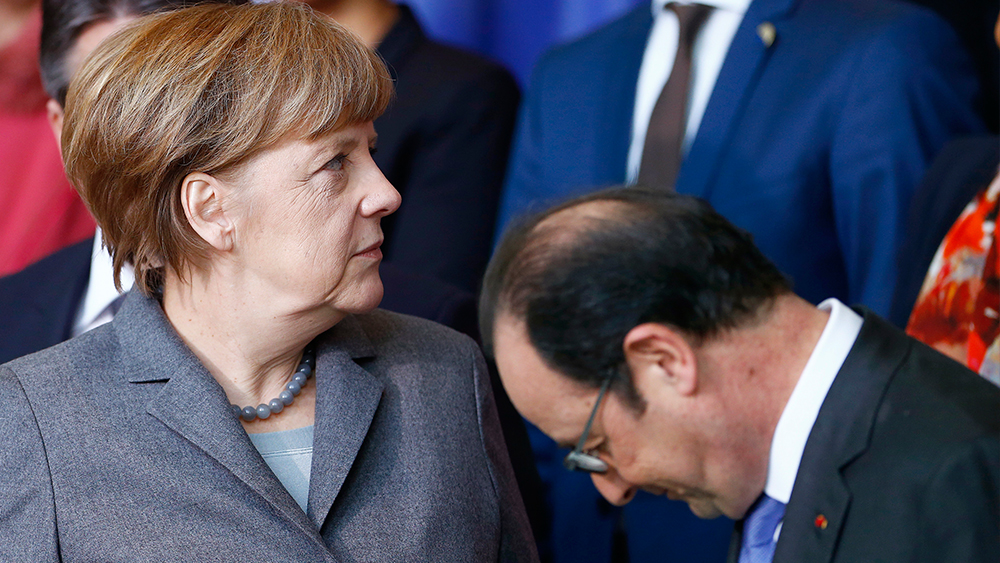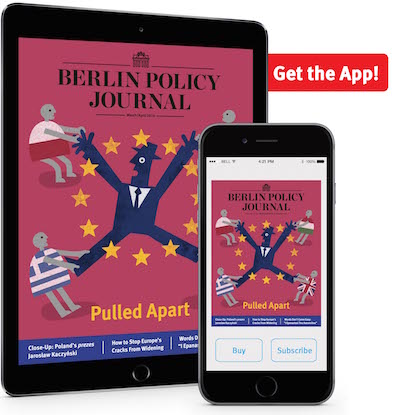Democratic principles are being questioned, nationalism is back, and the EU is dysfunctional. But Europeʼs biggest problem is the disappearance of an equal partner for Germany, says DOMINIQUE MOïSI.
Is German Chancellor Angela Merkel as isolated as is often reported? In a word: yes. Angela Merkel is isolated in Europe – and that demonstrates Europe’s pettiness and its lack of vision. Merkel is right, but she is alone in being right. That is a problem for Europe.
Merkel is managing the migration crisis in a way that is typical both for her and for the EU – by creating consensus step-by-step. Will she succeed? There is total disconnect between the “refugee calendar,” so to speak, and the EU calendar. The world watches the refugees’ misery while Europe keeps moving at its own pace. To use the analogy of Constantinople in 1453, it is a bit like discussing the gender of angels when the empire is falling apart. This is a major problem. A policy of small steps and finding consensus is good for discussing agricultural quotas or financial aid to Greece. But now people are dying in the cold. This is an entirely different level of human urgency.
Are we perhaps witnessing the limits of the whole European project? If one looks at the behavior of the so-called Visegrád states, Hungary in particular, one could come to the conclusion that the EU’s powers of transformation were perhaps overstated. Are we witnessing the slow retreat of liberal democracy? I think three things are coming together here. The first is the spread of democracy and with it, the questioning of democracies. There are more democracies in the world today than ever before – and democratic principles are also being questioned more than ever. The first symptom of this – the rise of populism – not only affects Europe, but the United States as well. The second element is the return of nations and nationalism with a vengeance. The French feel French when they are attacked by Daesh (the acronym used in France for the so-called Islamic State). They do not feel European – and this is probably true for all European nations. The British may be about to leave the EU because, at the end of the day, they never felt European. This leads to the third element: the dialectical nature of the process. The more Europe fails to deliver, the more people return to their nations. Why should they feel represented by this dysfunctional entity? In my mind, this is the heart of the problem. People no longer feel proud to be European.
How would you turn this around? By making Europe more active, or even proactive? I am not sure it is an institutional problem, thoug the move to a Europe of 28 states has clearly made the problem worse. It has made people realize that old practices no longer work. At the same time we have the divisions between north and south – between countries with successful economies and with failing economies. We also have the division btween Europe’s west and east – between countries with long-established democratic cultures and those whose impregnation with democratic principles came late and were perhaps somewhat superficial. But I believe that politics is the answer, and that brings us back to democracy. One of the key factors is that the Franco-German tandem is no longer functioning – not because Germany has become too big, but because France has become too small. For the last 20 years no French president has been a match for a German chancellor. Can we Frenchmen elect someone who will be on par with a German chancellor, restore the Franco-German relationship, and recreate some kind of dynamism within Europe? Spring 2017 – when the French elect their next president – will be a key moment for Europe.
What kind of candidate do you have in mind? Someone with a strong personality, with gravitas. Someone who does not have the need to be reelected for a second term. In short: Alain Juppé. Could he do it? I hope so, but I am not sure. Looking at the European situation from Paris, I see emptiness. Merkel should not be the only one to stand for Europeʼs morality and principles. I was ashamed when I heard French Prime Minister Manuel Valls denouncing Merkel’s refugee policies in Munich. And I am not proud when I hear the French president say that France will accept 30 000 asylum seekers – absolutely ridiculous when you think of the number of people that came to Germany last year.
Is it also a problem that European nations are steeped in their respective national debates? France has been hit very hard by terrorism; Italy is still traumatized by the mistake of voting Berlusconi into office three times; Germany is presently having a deeply polarizing debate about the refugee crisis … I think you are right. We are obsessed with our own national debates and we look to Europe to denounce its paralysis. In a way, it adds to the immorality of the national debate – a kind of negative dialectical process, which lies at the very heart of what we are discussing. We don’t feel good as Frenchmen, and Europe offers us an image back, a mirror reflection of our own weaknesses. There was a time when we were at least relevant, if not great. But we no longer are. So there’s this feeling that Germany calls the shots, this feeling that Germany decides. But of course it is not Germany deciding, it is France being absent.
… at a time when the United Kingdom and Poland are also quite inward-looking, rather than thinking about how a French-British-Polish-German EU motor could work. When then Polish Foreign Minister Radek Sikorski gave his Humboldt University speech in 2011, there was the chance of a “Club of Four,” but it came to be replaced by a “Club of One,” which really cannot work. And Berlin itself doesn’t want to carry the burden of this responsibility alone.
Paris was once very ambitious – not only in terms of European integration in general, but also for the Franco-German alliance. Why was that impetus lost? Leadership, and the lack of it. President Nicolas Sarkozy was energetic, but failed to realize the paramount importance of the Franco-German relationship. He started his Union for the Mediterranean initiative without even consulting Berlin. I remember former German President Richard von Weizsäcker coming to Paris fuming, “How could he do that? We’ve never felt so humiliated” etc. And then we moved from a charismatic, but problematic president to a president who is basking in his mediocrity – an able tactician, but one without vision or gravitas. As a consequence, reforms were not made and the French are obsessed with the comparison to Germany. We have to break out of this negative spiral. Yes, let’s not forget about the problem of Poland, the problem of the United Kingdom, the problem of Italy, the problem of Spain etc. But without meaning to sound narcissistic, for Europe, the Franco-German dimension is vital. In the past, when the two countries agreed, you could hope that something would happen. But now they are no longer playing in the same league. There is now a 50/50 chance that the United Kingdom is leaving the EU and this would be very bad for both the EU and its image in the world. And Poland may fall permanently to populism, which wouldn’t be good either …
… and then Marine Le Pen wins the French presidency in 2017! It is unlikely – but what if another series of terrorist attacks rocks France? As matters stand today, I don’t think Le Pen can win, but if something goes terribly wrong between now and spring 2017, you cannot even exclude that.
Read more in the Berlin Policy Journal App – March/April 2016 issue.








